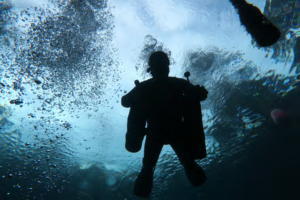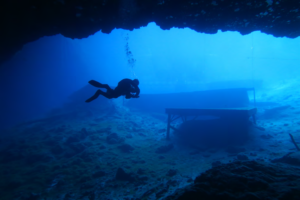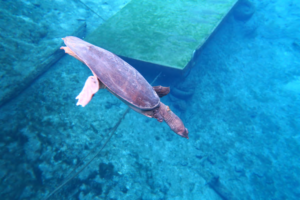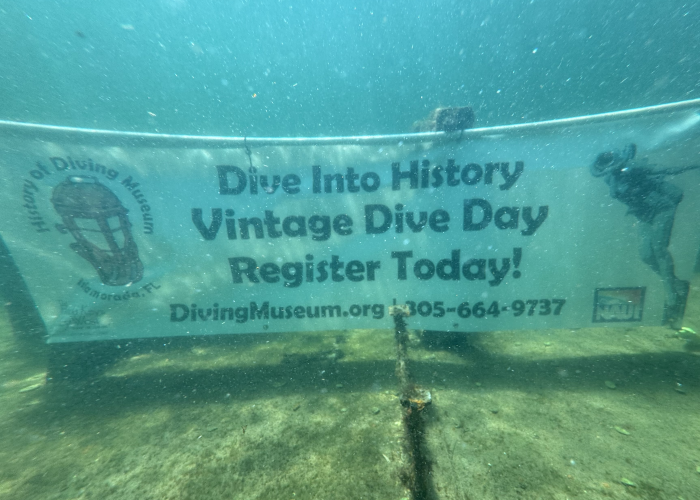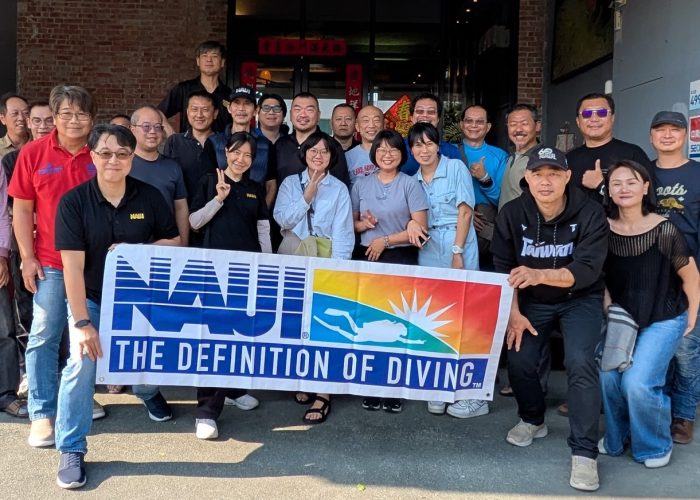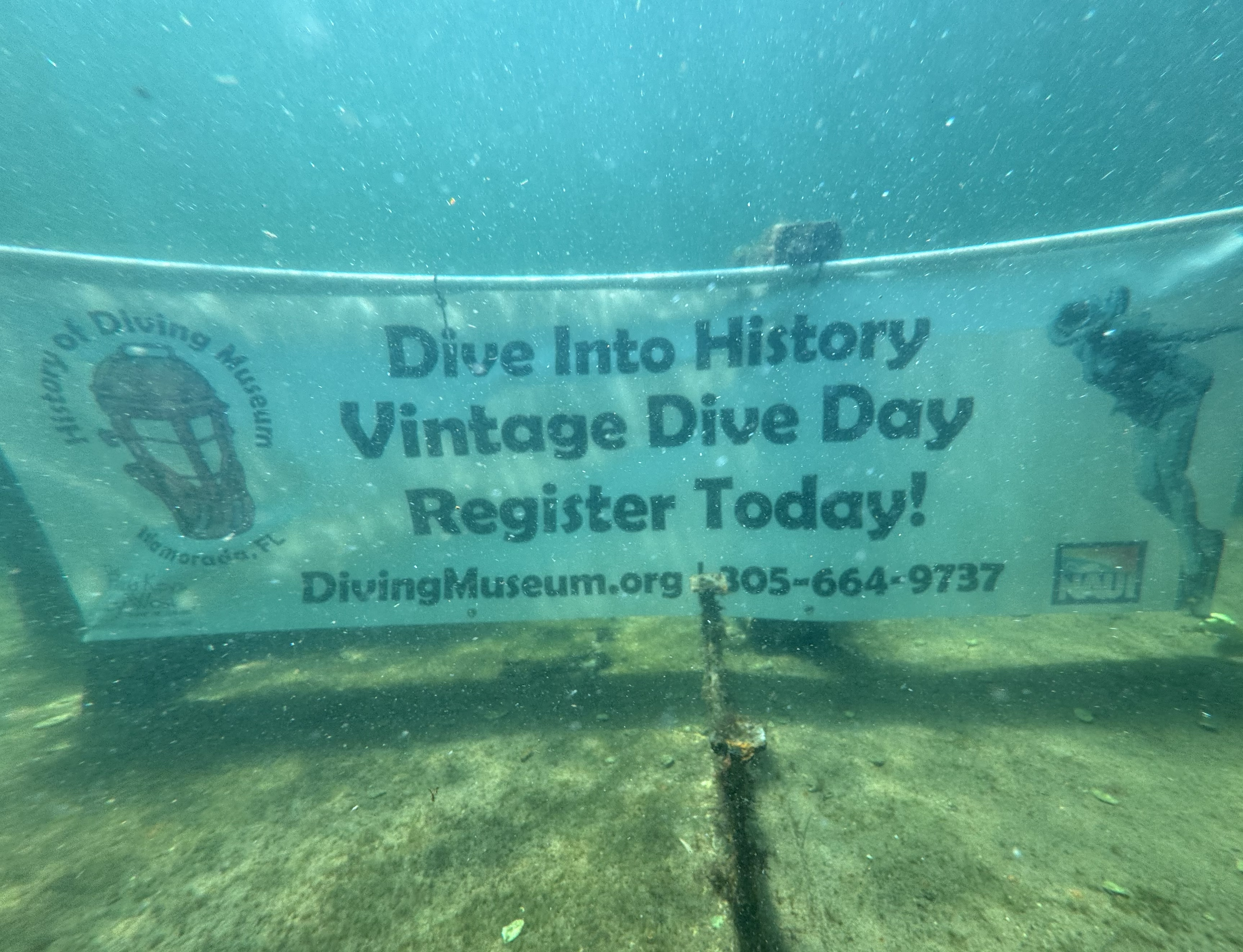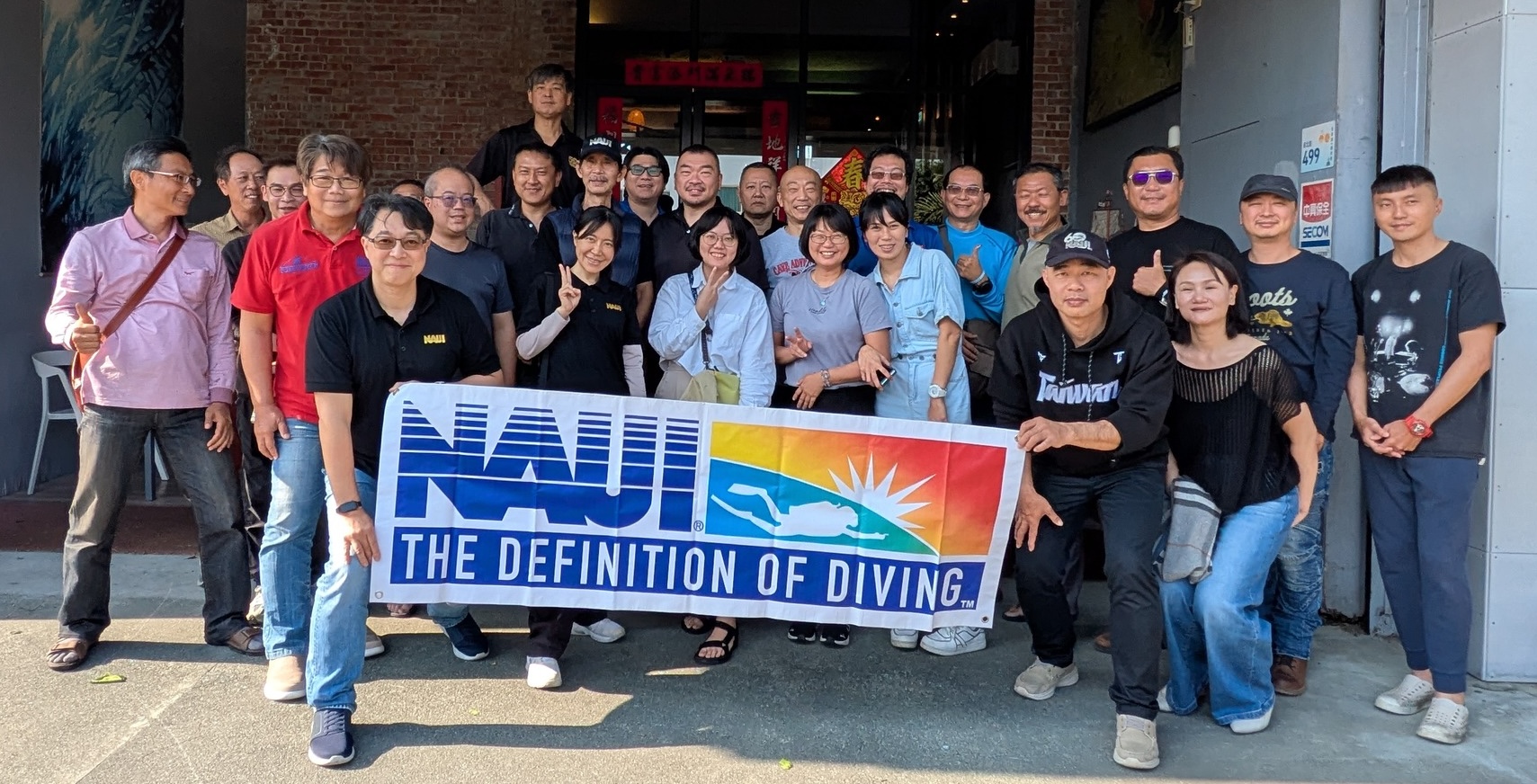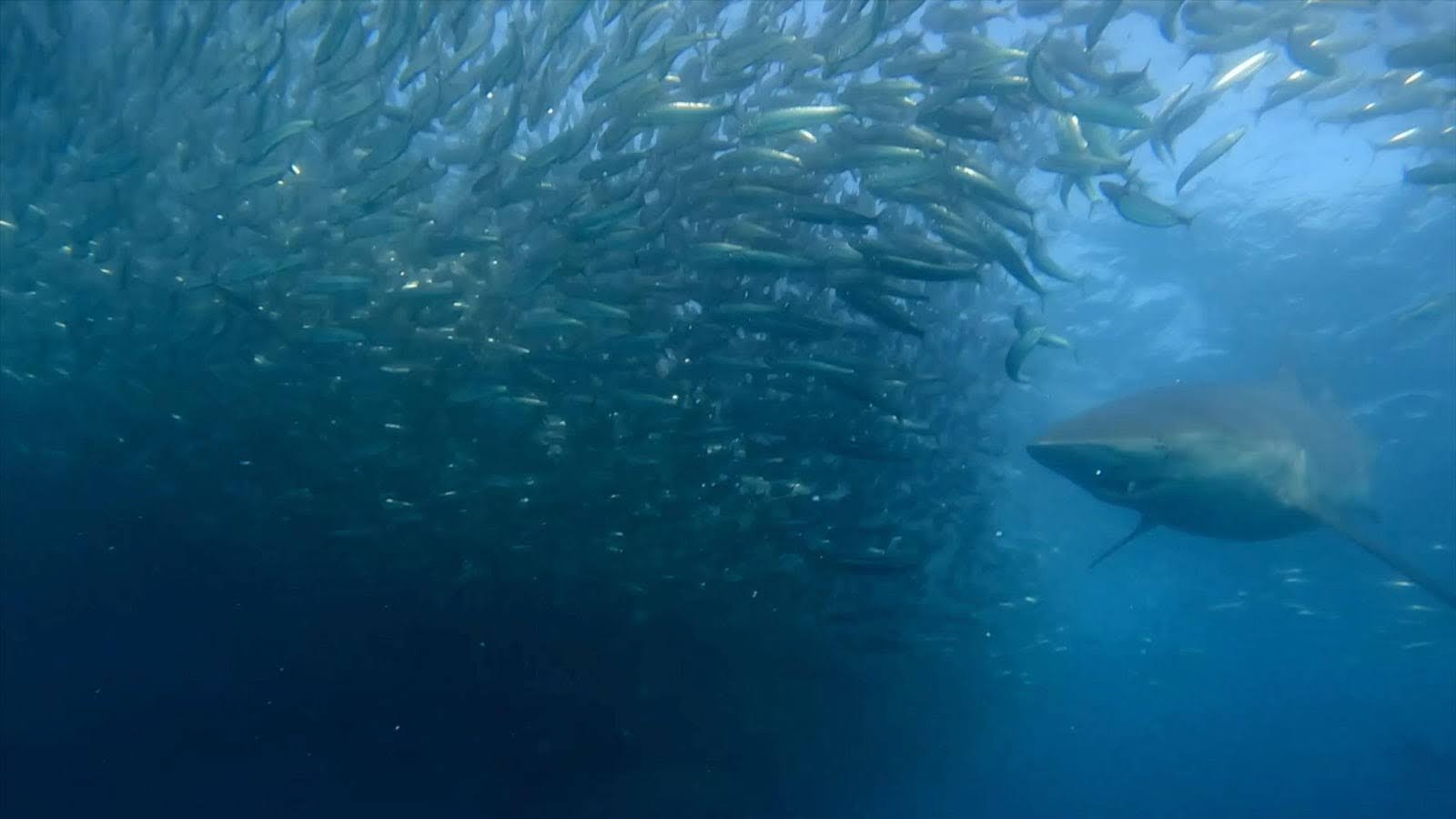Right now, everyone is dreaming of a diving getaway.
You can have your tropical vacations to the Bahamas, Barbados or Bermuda – but I will take another B: Blue Grotto.
The Blue Grotto Dive Resort is located in Williston, Florida, which is about forty minutes off the I-75 highway, a major thoroughfare that travels between Detroit, Michigan and Miami, Florida.
Like many dive sites that are off the beaten path, sometimes you need a fellow diver to recommend it to you. That occurred for me for the first time in February 2011 and I instantly was hooked. So much so that I visited again in 2014 and 2015!
When you first drive into the site, it is time to register at the front desk. As always, you need to make sure to have your certification and your logbook ready to present. A great advantage for instructors in particular is that there is an onsite pool and classroom available for one’s teaching needs. There’s also a fill station so you can do your “one stop diving” needs.
Blue Grotto, like many places offers a variety of diving options – from open water up to technical dive training. You should start – as you always should – by checking out your dive site. It is a short walk down the steps to see your entry point off the floating dock into the clear water.
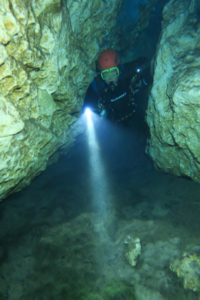
The second is called the “Upper Cavern” which has a feature called “Peace Rock” and goes a bit further than the Open Water level. It also has an amount of artifacts spread throughout the cavern at this depth. One cannot discuss Blue Grotto without mentioning the air bell, which features windows all around and a supply of breathable air that is pumped from the surface.
The third is the lower chamber. This is only for those who are diving at higher levels that have specialized training and are using specialized equipment. There is limited light so this depth is clearly not for open water level divers.
Now it is the time to go for a dive! You have checked off all the items on our pre-dive check list and speaking of checking things off – you make sure to complete your buddy checks. Safety first everyone!
You complete a perfectly executed giant stride entry and find ourselves floating at the surface. You are good to go; it’s time to descend. You take some time to look around at your surroundings. You first are enamored by the view; it’s clear everywhere. A site like this doesn’t tend to change much visibility-wise; you are not worried about waves or when the tide is going to roll in or out. Such is the benefit of an open-water dive site that in theory has its limits (although they are huge limits to boot).
You notice that you need to do some adjustments so you swim with your buddy over to one of the platforms. You adjust the straps on your BC once more to be sure. This site has several platforms that can be used for various levels of training and for adjustments.
You and your buddy also take the time to double check your minimum two lights and redundancy as you are planning to explore all aspects that Blue Grotto has to offer. It is important to note that in general that lights are not just for night dives but rather they also give benefits to areas that have lower light penetration from the surface but also that nook and cranny where that superb fish is hanging out. You should also be taking two lights with you. A dive buddy of mine was doing a Blue Grotto dive many years ago and encountered someone who didn’t have a light and was in a bit of a difficult situation – he was diving with more than two lights and happily lent one of his spare lights to the diver in question.
Now that your lights are confirmed on and functioning, you are fully ready to start. You and your buddy navigate towards the overhang that is directly in front of you. You explore the rock formation and are fascinated to think about how these rocks got here and how they became specifically formed. You also see a small statue placed in a tiny crevice and it makes you think of a similar statue in the scuba park back home.
You then move onto the air bell. While the dive bell is spacious you and your dive buddy in your pre-dive planning have decided it’s one diver at a time. You’ve never been in a diving bell so you enjoy the sensation – not to mention that because your regulator is out of your mouth and you’re breathing surface supplied air so you can extend your dive by just a bit more. With that being said you also realize that being in the dive bell is not a substitute for you planning your dive with the air that you have with you in your tank and then diving that plan as intended.
Since you and your buddy have your advanced diver certifications, you have planned to descend down to some deeper parts of the site to see what Blue Grotto has to offer you in the lower sections. One of the things you make sure to do is to turn around and look up. You are very aware that although access to the surface always exists that as you descend that it does not always seem that way. On this dive, however, the light is especially bright and you enjoy the sun’s rays that are penetrating the water.
When you reach the depth of your next part of your dive, you realize that you are in an area that has some parts that are a bit more of a tight squeeze. You make a note of talking to your instructor about taking a sidemount diving course that you always hear them talking about. You also realize that you are at the deepest part of the site that you are allowed to access; you see signage warning you about those small spaces and start your ascent.
As a good diver, you are making sure to complete multiple small safety stops on the way up you take some time to visit Peace Rock at 50 feet. While stopping there you once again take the time to marvel at the beauty of the dive site that you have had the opportunity to dive.
Near the surface, you finish off your final safety stop (15 feet/6 metres for three minutes) and you meet up with Virgil the turtle. Virgil the turtle strikes you on this dive as a wonderful creature who has places to go as she take the time to bless you with her presence. You’ve heard that at times he is gone for weeks or months at a time so you’re happy that you have this encounter with the resident social butterfly (or maybe social butterflyfish?).
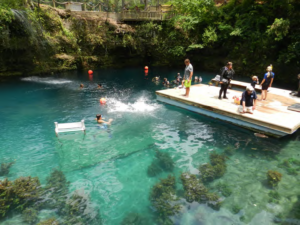
When you get back to your car (or perhaps your cabin if you are staying on site) you take the time to talk to your nondiver friends and exchange stories. You hear that they went for a swim in the pool and took the time to walk around the site topside and taken in the natural beauty of it all.
While this is not a point to point Google map style dive that I’ve ever taken, I hope that this simulation has given you time to reflect of what a dive at Blue Grotto might end up being. The great thing is that Blue Grotto is central to other northern Florida sites – you would do well by visiting Devil’s Den, Paradise Springs, Manatee Springs and Ginnie Springs. They are worth the drive from Blue Grotto (all within an a few hour’s drive) and each offer wonderful diving.
So what are you waiting for? Take some time to talk to your buddy and plan a visit to Blue Grotto!
Some information for this article was taken from Blue Grotto’s official website – www.divebluegrotto.com – which is chock full of information and well worth a click or two when planning your upcoming visit!
